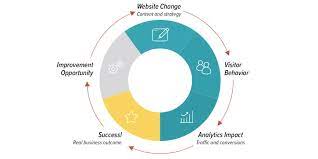The Importance of SEO Web Optimization
Search Engine Optimization (SEO) is a crucial aspect of any website’s success in the digital landscape. By optimising your website for search engines, you can improve its visibility, attract more organic traffic, and ultimately drive conversions.
One key component of SEO is web optimization. This involves fine-tuning various elements of your website to ensure it is search engine-friendly and provides a seamless user experience. Here are some reasons why SEO web optimization is essential:
Improved Search Engine Ranking
Optimising your website for search engines can help improve its ranking on search engine results pages (SERPs). By incorporating relevant keywords, meta tags, and high-quality content, you can signal to search engines that your website is valuable and authoritative.
Enhanced User Experience
A well-optimised website not only performs better in search engine rankings but also provides a better user experience. By ensuring fast loading times, mobile responsiveness, and intuitive navigation, you can keep visitors engaged and encourage them to explore further.
Increased Organic Traffic
SEO web optimization can help drive organic traffic to your website. When your site ranks higher in search results for relevant keywords, you are more likely to attract users who are actively seeking the products or services you offer. This targeted traffic can lead to higher conversion rates.
Competitive Advantage
In today’s competitive online landscape, having a well-optimised website can give you an edge over competitors. By staying ahead of the curve with SEO best practices and continually refining your web optimization strategies, you can position your site as a leader in your industry.
In conclusion, SEO web optimization plays a vital role in the success of any website. By focusing on improving search engine rankings, enhancing user experience, driving organic traffic, and gaining a competitive advantage, you can unlock the full potential of your online presence.
Understanding SEO Web Optimisation: Key Questions and Insights
- What is SEO web optimization?
- Why is SEO web optimization important for websites?
- How does SEO web optimization improve search engine rankings?
- What are the key elements of SEO web optimization?
- How can I measure the success of SEO web optimization efforts?
- What are some common challenges faced in implementing SEO web optimization strategies?
What is SEO web optimization?
SEO web optimization refers to the process of fine-tuning various elements of a website to enhance its visibility and performance in search engine results. It involves implementing strategies such as keyword research, meta tag optimization, content creation, and technical improvements to ensure that a website is easily discoverable by search engines and provides a seamless user experience. By focusing on SEO web optimization, businesses can improve their search engine rankings, attract more organic traffic, and ultimately drive conversions.
Why is SEO web optimization important for websites?
SEO web optimization is crucial for websites because it directly impacts their visibility and performance in search engine results. By implementing effective SEO strategies, websites can improve their search engine rankings, attract more organic traffic, and ultimately increase their online presence. Optimising various elements of a website, such as content, meta tags, and site structure, not only helps search engines better understand the site’s relevance but also enhances the overall user experience. In today’s competitive digital landscape, SEO web optimization is essential for websites to stand out, drive targeted traffic, and achieve their online objectives effectively.
How does SEO web optimization improve search engine rankings?
SEO web optimization improves search engine rankings by fine-tuning various elements of a website to make it more search engine-friendly and user-centric. By incorporating relevant keywords, meta tags, and high-quality content, SEO helps search engines understand the relevance and value of a website’s content. Additionally, factors such as site speed, mobile responsiveness, and user experience play a crucial role in ranking algorithms. When a website is optimised for these aspects, it not only attracts search engine crawlers but also provides a seamless experience for visitors, ultimately boosting its visibility and authority in search engine results pages.
What are the key elements of SEO web optimization?
When it comes to SEO web optimization, several key elements play a crucial role in enhancing a website’s visibility and performance. These elements include keyword research and implementation, on-page optimization such as meta tags and headings, high-quality and relevant content creation, mobile responsiveness for improved user experience, site speed optimization for faster loading times, backlink building to establish authority, and regular monitoring and analysis to track performance and make necessary adjustments. By focusing on these key elements of SEO web optimization, businesses can effectively improve their search engine rankings and attract more organic traffic to their websites.
How can I measure the success of SEO web optimization efforts?
Measuring the success of SEO web optimization efforts is crucial for evaluating the effectiveness of your strategies and making informed decisions for future improvements. Key performance indicators (KPIs) such as organic traffic growth, keyword rankings, conversion rates, and bounce rates can provide valuable insights into the impact of your SEO efforts. Tools like Google Analytics and Search Console offer detailed data on website performance, user behaviour, and keyword visibility. By regularly monitoring these metrics and analysing trends over time, you can assess the ROI of your SEO initiatives and make adjustments to maximise results.
What are some common challenges faced in implementing SEO web optimization strategies?
Implementing SEO web optimization strategies can present various challenges for website owners and digital marketers. One common issue is the ever-evolving nature of search engine algorithms, which require continuous adaptation and updates to stay relevant. Additionally, balancing technical SEO elements, such as site speed and mobile responsiveness, with high-quality content creation can be a delicate task. Another challenge lies in effectively targeting the right keywords and optimising content for user intent while keeping up with competitive keyword landscapes. Furthermore, measuring the impact of SEO efforts and adjusting strategies based on data analysis can be complex but essential for success in the highly competitive online environment.

